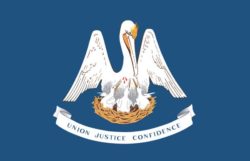Etienne de Perier
From 1727 to 1733 Etienne de Périer governed Louisiana as commandant-general for the Company of the West (later known as the Company of the Indies), which then held a charter for the development of the Louisiana colony.
From 1727 to 1733 Etienne de Périer governed Louisiana as commandant-general for the Company of the West (later known as the Company of the Indies), which then held a charter for the development of the Louisiana colony. During this period, Périer attempted to stimulate the agricultural sector by encouraging colonists to grow tobacco and citrus trees. The low point of his term came when Natchez Indians attacked Ft. Rosalie, a French settlement at Natchez, and killed 236 settlers.
Etienne de Périer was born in Le Havre, France, c. 1690. After serving as a naval captain in the latter stages of the War of Spanish Succession (1701-1714), he went to work for Company of the West. To reward his dedication, company officials nominated Périer for the position of commandant-general of Louisiana; the king ratified the nomination on August 9, 1726. Périer, his wife (the former Catherine Le Chibelier) and her son from a previous marriage, De Chambellan Graton, arrived in New Orleans on March 15, 1727.
Périer immediately assumed office on his arrival. Though he lacked political experience, he successfully undertook public works including the construction of levees, a park, and a conservatory. Périer also oversaw the deepening of the Mississippi River’s main channel to allow the passage of larger ships and the beginning of construction on the Ursuline Convent.
Périer’s lack of respect for the neighboring Natchez Indians, however, proved disastrous. The French had previously enjoyed good relations with the Natchez and a number had farms near the Natchez Grand Village. Although the exact circumstances are unknown, it is believed that Périer wanted to build a plantation at this location and chose the most fertile land—land belonging to the Natchez—for himself. When they were ordered to vacate, members of the tribe responded by attacking the settlers on November 28, 1729, killing 236 and taking 230 women and slaves captive. Périer responded with force, capturing many of the Natchez warriors and sending them to St. Domingue to work on sugar plantations. He declared his campaign a success, although he was later criticized for not wiping out the colony when he had the opportunity.
Failing to find riches and disturbed by the Natchez massacre, the Company of the West asked the French Crown to take back control of the colony. On March 2, 1733, Périer was recalled from office and replaced by former governor Jean-Baptise Le Moyne, Sieur de Bienville. Following his retirement from office, Périer established a residence at Brest, France, and was rewarded with the Cross of St. Louis and a modest pension. He sold his Louisiana plantation, Monplaisir, to Jean-Charles de Pradel, and died in 1755.
Adapted from Brian E. Couttus’ entry for the Dictionary of Louisiana Biography, a publication of the Louisiana Historical Association in cooperation with the Center for Louisiana Studies at the University of Louisiana, Lafayette.
Sources: Dunbar Rowland and Albert G. Sanders, eds., Mississippi Provincial Archives: French Dominion, 3 vols. (1927-1932); Rowland, Sanders, and Patricia Galloway, eds., Mississippi Provincial Archives: French Dominion, vols. IV-V, (1984); Pierre Heinrich, La Louisiane sous la Compagnie des Indes, 1717-1731 (1908); Jacob M. Price, France and the Chesapeake: A History of the French Tobacco Monopoly (1973); Charles E. O’Neill, Church and State in French Colonial Louisiana: Policy and Politics to 1732 (1966); Patricia D. Woods, French-Indian Relations on the Southern Frontier, 1699-1762 (1980).
